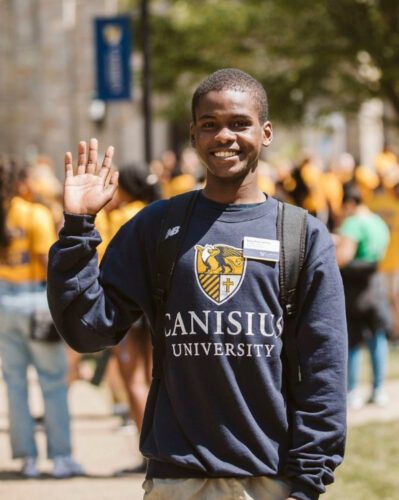As Canisius University’s public safety liaison and deputy supervisor for its work-study program, senior Tariq LeFever often dedicates time to serving his campus community. This fall, LeFever applied his strong sense of civic responsibility to serving his biggest audience yet – the readers of Wikipedia.
“Wikipedia’s reach and accessibility make it a powerful tool for democratizing knowledge and amplifying underrepresented perspectives,” said LeFever, reflecting on his Wikipedia assignment experience in the Political Parties course he took last term. “This assignment felt more impactful because it allowed me to engage with real-world audiences and make a tangible contribution to public discourse.”
LeFever, a political science major focusing on social justice and race-related issues, hopes his efforts to improve the felony disenfranchisement in the United States article on Wikipedia will help prevent the spread of misinformation by giving readers a more complete understanding of the topic. The historical context and layered implications of denying felons the right to vote are critical to a more nuanced perspective, he explained.

“Felony disenfranchisement disproportionately affects marginalized communities and perpetuates systemic inequality in the United States,” emphasized LeFever. “I chose this topic to shed light on these injustices and ensure the information is accessible to a broad audience.”
The new Wikipedian transformed several parts of the article, adding more than 1,100 words to underdeveloped sections that outline the economic, political, health, and recidivism implications of felony disenfranchisement. LeFever also added new details about state-specific reform efforts and context for how felony disenfranchisement policies in the United States disproportionately impact people of color.
“I wanted to ensure the article was balanced, well-sourced and emphasized the racial and socio-economic disparities tied to felony disenfranchisement,” said LeFever. “I hope readers come away understanding how voting restrictions contribute to broader patterns of disenfranchisement.”
While LeFever hopes readers will learn from his work, his own learning experience extended well beyond the topic itself.
“I learned to critically evaluate sources, identify bias, and distill complex information into accessible content, [all] essential for navigating today’s information landscape,” explained LeFever.
He also noted that the assignment sharpened his research, fact-checking, and writing abilities – skills that will be invaluable as he pursues a career in public policy or advocacy, with a focus on civil rights and equity.
While he initially found Wikipedia’s formatting policies a bit challenging, LeFever embraced the chance to learn something new and enjoyed seeing his work live and accessible on the site.
“It felt rewarding to contribute to a larger conversation,” said LeFever, who plans to continue to edit in his free time. “This experience has shown me how powerful Wikipedia can be as a platform for advocacy and education.”
Wiki Education thanks the Bernard and Audre Rapoport Foundation for their support of impactful student work like LeFever’s to enhance accuracy of information and promote digital citizenship on Wikipedia.
Interested in incorporating a Wikipedia assignment into your course? Visit teach.wikiedu.org to learn more about the free resources, digital tools, and staff support that Wiki Education offers to postsecondary instructors in the United States and Canada.
